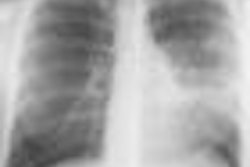
NEW YORK (Reuters Health), Oct 22 - In the nondisabled elderly, severe age-related white-matter changes are associated with urinary urgency, European researchers report.
Senior investigator Dr. Leonardi Pantoni told Reuters Health that "the most important message coming out from our study is that urinary complaints, so common in the elderly, may indeed at least partially depend on a brain dysfunction caused by cerebrovascular disease."
Pantoni, of the University of Florence, and colleagues examined data from 639 subjects with age-related white-matter changes. Their mean age was 74.1 years, 351 were women, and 288 were men. The degree of age-related white-matter changes was graded on MRI as mild, moderate, or severe.
There was no significant difference in nocturia, urinary frequency, or incontinence among the groups, but there was a significant difference in the prevalence of urinary urgency.
Urinary urgency affected 16% patients with mild age-related white-matter changes, 17% with moderate changes, and 25% with severe white-matter changes (p = 0.03).
After adjusting for factors including age, sex, and diabetes mellitus, age-related white-matter changes continued to be independently associated with urinary urgency, with an odds ratio of 1.74 between the mild and severe group, the researchers report in the October issue of the Journal of the American Geriatric Society.
Those with urinary urgency also had greater changes in age-related white-matter volumes than those without the condition. Factors such as a history of depression, gait disturbances, and memory problems appeared to have no influence.
The view that brain dysfunction caused by cerebrovascular disease may underlie these problems, continued Pantoni, "is supported by the fact that study patients with the most severe vascular brain changes were at higher risk of such disturbances in comparison with those with only minimal changes, once many other factors were also considered."
He concluded that "these data may have future therapeutic implications."
J Am Geriatr Soc 2008;56:1638-1643.
Last Updated: 2008-10-20 18:01:27 -0400 (Reuters Health)
Related Reading
Cognitive decline predicted by brain scans in asymptomatic elderly, March 2, 2006
Copyright © 2008 Reuters Limited. All rights reserved. Republication or redistribution of Reuters content, including by framing or similar means, is expressly prohibited without the prior written consent of Reuters. Reuters shall not be liable for any errors or delays in the content, or for any actions taken in reliance thereon. Reuters and the Reuters sphere logo are registered trademarks and trademarks of the Reuters group of companies around the world.

















